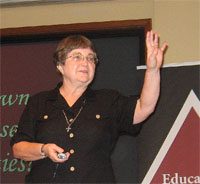
10th
Biennial Dominican Colleges Colloquium
MADISON, WI , July 21, 2008-- Imagine a family reunion; except at this reunion you are related to people from around the United States, and your family is 800 years old. But at this reunion you came with maybe three or four other people you knew. This experience is similar to the days of the Dominican Colleges’ Colloquium, which were recently held at Edgwwood College Each Dominican affiliated institution of higher learning was represented by one or more faculty or staff or community members at the conference. Each participated in the Colloquium by attending full group and breakout sessions, as well as socials, prayer, and liturgical events. Toni Harris, OP (Sinsinawa) Dominican International Co-Promoter for Peace and Justice, set the tone for the conference. She presented a riveting proposal entitled “The World Is Their Cell and the Sea Is Their Cloister.” Her remarks centered on the charism of the Order of Preachers, which is to preach the gospel to the earth. Although it is rooted in a spectacular history with many saints preaching the gospel with their lives, being Dominican does not require divinity, but rather integration. “Rather than saying ‘What extra activity can I add to promote peace and justice?’ we need to ask the question, ‘How can I integrate this common mission into the way we do what we always do?,” Harris said. Sr. Toni also highlighted parts of each institutions’ mission statement that require, strive, promise, and promote justice at all costs. "We, who are students, youth, faculty, staff, adults—representatives, laity, and family of the Order of Preachers, also must act upon these promises," she said. She challenged the group at large to keep pushing for justice by working with their institutions, their students, in their curriculums as members of both a community of higher education and a Dominican community. She concluded with the question: “What will they say about Dominican institutions? Will they be able to say that the world is our classroom and we use every means possible to build global solidarity?” Along with the full-group sessions, participants also engaged in small group sessions. In following the Dominican pillars of study, contemplation, sharing with others our fruits of contemplation, and living out Gospel Justice, the leaders of the breakout sessions were from many of the institutions represented. A person may have presented on a topic about business ethics, but then he was encouraged to attend sessions led by his peers to understand a different part of living out justice. Topics included in the breakout sessions ranged from language arts, drama, business, ministry and mission, and multicultural issues to social justice, meaningful student involvement, service learning, and Dominican Identity. One breakout session led by Aurelie Hangstrom, Associate Professor of Theology of Providence College in Providence, RI, explored the vocation and mission of laity, especially according to Yves Congar, OP. Though a dense topic, Dr. Hangstrom was able to use her skill and help her peers understand the role of laity in the Church today. “Baptism becomes the basis for the call of laity to follow Christ’s role as priest, prophet, and king. The meaning of our vocation comes from the sacrament of Baptism. … One does not give up their baptismal call once they have married or become a priest,” Hangstrom said. The priest is neither better nor worse than the lay person, and the laity is neither better nor worse that those who are vowed religious; rather they complement each other as a “symphony of vocations,” Hangstrom said. Concluding the Colloquium, three of the presidents from the colleges and universities represented shared their own view of preaching. Each shared a story of the real people who preach with their lives on campuses across the country. All three emphasized what was shared in the beginning of the conference: preaching the Gospel is not necessarily standing at the pulpit. Most of the time, the Order of Preachers embrace their preaching as a way of life. As Dr. Drew Bogner, president of Molloy College in Rockville Centre, NY said, “Profound is in the everyday, in every way!” The presidents’ reminder sent the participants out with the message that preaching is using their position in a Dominican institution to educate toward a just and compassionate world. Rachel DeBruin |
subscribe to
DomLife.org and receive a free email update every two weeks. unsubscribe |



